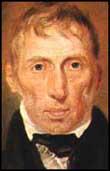John McAdam

John Loudon McAdam was born in Ayr on 21st September, 1756. His father was fairly wealthy but lost his money in a bad investment in a local bank. When he was fourteen he moved to New York City to work at his uncle's counting-house. His father's brother, William McAdam, had already established himself as a prosperous merchant. McAdam was taken into the home of this childless couple. After his uncle retired he took over the company.
By 1778 he married Gloriana Margaretta Nicoll, the daughter of a wealthy lawyer. When the America achieved its independence, McAdam decided to return to Scotland, where he purchased a house and estate at Sauchrie. As his biographer, Brenda J. Buchanan, pointed out: "John Loudon McAdam's enforced return propelled his career into its second phase, as a Scottish country gentleman and business entrepreneur. He became a magistrate; a trustee of the Ayrshire turnpike roads; deputy lieutenant of the county; and the officer in charge of a volunteer artillery corps when in 1794 a French invasion seemed imminent."
In 1798 the family moved to Bristol. He established a company that became involved in the chemical industry. In 1811 he helped to establish the Bristol Commercial Rooms, becoming the first president, and played a leading part in the campaign for a new prison in the city. He took an interest in road building and published a book, entitled Remarks on the Present System of Road Making. McAdam claimed in the book that his views were based on a study of the conditions found on his travels, covering, he claimed, over 30,000 miles.
In 1816 he was appointed surveyor to the Bristol Turnpike Trust. He remade the roads under his control with crushed stone bound with gravel on a firm base of large stones. A camber, making the road slightly convex, ensured the rainwater rapidly drained off the road and did not penetrate the foundations. This way of building roads later became known as the Macadamized system.
Brenda J. Buchanan has explained: "McAdam's recommended system of road construction involved the careful preparation of a well-drained subsoil, levelled, but with a slight fall from the centre of 1 inch to the yard. The roadstone was to be broken by seated workers with small-handled hammers into rough pieces weighing no more than 6 oz that would fit into the mouth. McAdam had observed that large stones were likely to be cracked by passing vehicles and sent flying, but that smaller, angular ones, applied to a depth of 10 inches and compressed by workmen, were consolidated by traffic to produce a resilient and impermeable surface which improved over time. These techniques were simple, effective, and economical."
By 1819 the Bristol Turnpike Trustcontrolled 178 miles, and McAdam's salary had risen to £500 a year. As his reputation grew McAdam was able to extend his influence further by becoming a surveyor or consultant to other trusts. By 1819 McAdam and his two sons worked for twenty-five trusts. As a result of his success, MacAdam was made surveyor-general of metropolitan roads in England. It has been calculated that between 1820 and 1825 McAdam received £6000 from public funds.
Gloriana McAdam died in 1825. Two years later he moved to Hoddesdon and married her much younger relative, Anne Charlotte Delancey (1786–1862). Although he left the Bristol Turnpike Trust he continued to work as a a surveyor.
The eighty-year-old John McAdam died on 26th November, 1836.
